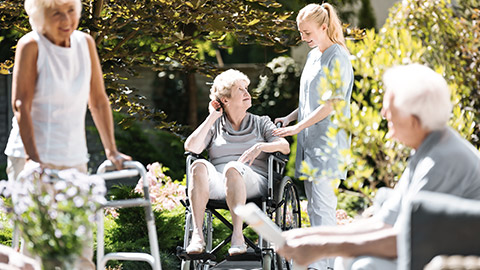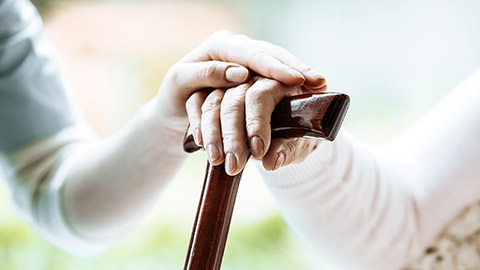In this topic you will learn about the roles and responsibilities in the aged care industry various support practices, key concepts and philosophy and cultural diversity needs. By the end of this topic, you will understand:
- Roles and Responsibilities in Aged Care
- Current support practices in Aged Care
- Key philosophies and concepts
- Cultural diversity in context of aged care.

The wide variety of roles in aged care are all instrumental in the support they provide to a person. They include different responsibilities that require specific skills and varying personalities of staff. Guidelines support the manner in which all staff should engage with the aged population in care.
There are many roles that come together to make up the aged care sector and that contribute to either residential or home care. Other than the clinical side of aged care, several other job roles participate in age care, including the following:
- Carer/Support workers
- Hospitality (chefs and cooks)
- Administration
- Human resources
- Maintenance and cleaning
- Leaderships and management
Primary health and allied health roles are those that provide most of the care of the resident or patient, these may include:
Registered Nurse
Registered Nurses in aged care are responsible for providing medical care, managing medications, conducting assessments, and coordinating care. Registered Nurses can conduct medical assessments, administer medications, develop care plans, implement treatments, and provide wound care and other medical interventions. They are often given the role of unit manager or team leader and are responsible for supervising enrolled nurses (ENs), assistants in nursing (AINs) and personal care attendants (PCA).
A registered nurse can provide:
- care and medication (or medication management) to residents support and mentoring to other aged care workers in their roles
- care plans and assessments (or organise assessments to be completed if through doctors and other providers)
- the ongoing assessment and review of any impacts that medication may have on a resident’s health or behaviour
- leadership during infection control breaches e.g., COVID-19, flu
- complex pain management
- some palliative care treatments and services.
Enrolled Nurses
Enrolled Nurses (ENs) work under the direct or indirect supervision of a Registered Nurse (RN), with the RN providing them direction and supervision during certain procedures. The main roles of the EN may include:
- observing the resident or patients’ vital records and any behavioural changes, recording and reporting any changes to the RN
- providing some assessments e.g., physical examinations, measuring blood sugar levels, temperature, pulse, blood pressure or respiration
- aiding with personal care and hygiene e.g., showering, dressing, toileting and more
- physical and emotional support for both residents and their families
- assisting with rehabilitation
- assisting with exercise programs
- planning and evaluating the nursing care plans with the RN and health care team
- general first aid in emergencies.
Assistant In Nursing (AIN)
An Assistant In Nursing (AIN) performs some nursing duties under the supervision of registered nurse however they are not technically a nurse. Depending on the workplace this role can be considered as the same or different to that of the Personal Care Attendant (PCA). The role of AINs can be different to that of the PCAs as AINs have some input into clinical care, whereas PCAs do not. The primary focus of PCAs is to provide basic care and personal care. The main role of an AIN will include:
- assisting with mobility equipment
- helping with food and fluids
- supporting physical function via rehabilitation programs and plans
- maintaining domestic aged care arrangements
- observing residents and patients around any health or behavioural changes, documenting and reporting any changes to the RN
- assisting the nursing staff with treatments
The care worker, support worker or Personal Care Attendant (PCA)

The care worker or Personal Care Attendant (PCA) is responsible for the daily living assistance a person requires. This can include personal and self-care, medical support, home duties and social supports. It is important to gather a clear understanding of the individual job description as the role can vary between the role of a ‘support worker’ and ‘lifestyle worker’ or become amalgamated with these roles. Each role requires care and sensitivity towards the individual and respect for their ongoing self-determination.
The PCA will support with many sensitive bodily tasks and areas that can make a person feel vulnerable and incapable. This means that although the role requires them to supervise the person for their own safety at times, they need to remember that the person is in a vulnerable position. For this reason, PCAs must protect the person’s rights and ensure that their rights are respected. They can also be involved in providing emotional support. Support workers are individuals who directly assist and support people with disabilities in their daily lives. Their primary role is to provide practical assistance, emotional support, and facilitate the overall well-being of individuals with disabilities.
The main roles and responsibilities are:
- Direct Support: They have the responsibility to provide direct assistance and support to individuals This can include helping with personal care, mobility, household tasks, and facilitating community engagement. They should ensure the well-being, dignity, and safety of the person they are supporting, while promoting their independence and autonomy.
- Communication and Advocacy: need to effectively communicate with individuals to understand their needs, preferences, and goals. They should advocate for the rights and interests of the person they are supporting, ensuring their voice is heard and respected. This includes communicating any concerns, issues, or progress to supervisors and relevant professionals.
- Documentation and Reporting: responsible for maintaining accurate records of their interactions and activities with individuals. This involves documenting the support provided, any incidents or changes in the person's condition, and following proper reporting procedures as per organizational policies and protocols. This information helps in tracking progress, assessing needs, and ensuring continuity of care
In a nutshell, The care worker , support worker or Personal Care Attendant (PCA)are people who provide care in terms of:
- Assisting individuals with daily activities such as personal care, mobility, and communication.
- Providing emotional support and companionship.
- Implementing individualized care plans and strategies.
- Facilitating community engagement and social inclusion.
- Monitoring and documenting the progress and well-being of individuals.
- Advocating for the rights and needs of individuals
Health Professionals

General Practitioners (GPs)
Most older people will have their own General Practitioners (GPs); however, many residential care facilities engage an aged care GP that acts as a resident doctor for the residents of the facility. Providing a resident GP in a facility ensures a consistent approach and continuity of care for patients. A resident GP will have a thorough understanding of the unique needs of an aged care facility which is an ongoing comfort to patients. They also build ongoing professional relationships and familiarity with the care providers. GPs in general aim to become a part of the multidisciplinary team by:
- carrying out comprehensive medical assessments
- contributing to care plans and case conferences
- collaborating with pharmacists on medication management
- providing comprehensive handovers and regular updates to facility staff and will take care of all the administrative work associated with the care they provide
Allied health providers
The role of Allied Health Professionals in aged care is to provide specialized healthcare services that focus on improving the physical, cognitive, emotional, and functional well-being of older adults. These professionals play a crucial role in enhancing the quality of life and independence of older individuals in aged care settings.
Some common Allied Health Professionals in aged care include physiotherapists, occupational therapists, speech-language pathologists, psychologists/counselors, and dietitians/nutritionists. Their scope of practice is centered around providing specialized rehabilitation and therapeutic services to support older individuals in maintaining their physical, cognitive, and emotional health. These providers will often be an important part of the health and wellbeing of an older person.
They can provide care, treatment, assessments, plans and strategies for the ongoing support of patients and often support ENs, AINs and care workers to continue to implement and support areas of therapeutic care. In most cases the allied health worker will come to work with their special client, though some residential facilities have their principal therapists that come to support residents throughout the facility for continuity of care. Allied Health Professionals Australia (AHPA) define ‘allied health workers’ as: “health professionals that are not part of the medical, dental or nursing professions. They are university qualified practitioners with specialised expertise in preventing, diagnosing and treating a range of conditions and illnesses. Allied health practitioners often work within a multidisciplinary health team to provide specialised support for different patient needs”
Multidisciplinary Models
In aged care, various multidisciplinary models are used to bring together professionals from different disciplines to provide comprehensive care and support.
Here is a brief description of the commonly used multidisciplinary models:
- Intradisciplinary Model: In this model, professionals from the same discipline work together within their own field to address the needs of older individuals. They collaborate closely, sharing knowledge and expertise within their discipline to deliver coordinated care.
- Multidisciplinary Model: This model involves professionals from different disciplines working independently to provide individualized care. Each discipline assesses and addresses the older person's needs within their own scope of practice, and coordination occurs through regular communication and sharing of information.
- Cross-disciplinary Model: In the cross-disciplinary model, professionals from different disciplines collaborate and share responsibilities. They actively work together, pooling their expertise and skills to provide holistic care. This model encourages professionals to integrate their knowledge and skills to address the comprehensive needs of older individuals.
- Interdisciplinary Model: The interdisciplinary model emphasizes collaboration and shared decision-making among professionals from different disciplines. They work together as a team, exchanging information, coordinating care plans, and providing integrated services. The focus is on creating a unified approach to care that addresses the whole person.
- Transdisciplinary Model: The transdisciplinary model promotes a fluid and flexible approach to care. Professionals from various disciplines blur the boundaries of their roles and responsibilities, working together in a seamless manner. They share knowledge, skills, and responsibilities to provide a holistic and individualized approach to care.
These multidisciplinary models recognize the importance of collaboration, communication, and coordination among professionals from different disciplines in aged care settings. By leveraging the expertise of multiple disciplines, these models aim to deliver comprehensive and person-centered care to older individuals.
Occupational Therapist (OT)

Occupational Therapists work with participants of any age to maximise a person’s independence and ability to participate in everyday life. Common conditions in older people such as loss of sight, balance, memory, mobility or hearing impact on their ability to participate in the everyday routines of life. Occupational therapists assess the person’s current abilities to develop strategies to maintain a meaningful level of independence and daily routines.
Areas of focus may include:
- falls prevention
- toileting and eating skills
- social skills
- fine and gross motors skills
- emotional self-regulation and coping skills
- behaviour support
Physiotherapy
Physiotherapists provide supports to people of all ages and typically will support people with Physical injury or disability, post-surgery, brain injury, cerebral palsy and neurological disorders. Physiotherapists often support people by managing pain, improved breathing techniques and improving their mobility. They are often engaged to support a person’s participation in sports and recreational activities. Physiotherapists assess posture, muscle tone, mobility and strength and can provide support, treatment and techniques for:
- exercise programs for participants
- joint manipulation and massage
- hydrotherapy exercises
- training other on how to support the participant
- the use of special equipment.
Psychology, Counselling, and Behavioural Psychology
Most people are familiar with the role a psychologist plays in mental health support. Psychologists can work with older adults to support ‘ongoing functional support for day-to-day living’ This may relate to such areas as:
- supporting the impact of their disability and in regard to their psychosocial self
- building self-confidence
- developing skills for coping
- supporting self-expression
- behavioural psychology for behaviours of concern
- supporting individuals with social skills
- helping participants with emotional regulation
- supporting the capacity to participate in social and community activities
- supporting the improvement daily living skills for independence
Positive Behaviour Support (PBS)
Positive behaviour support is an evidence-based intervention that supports people with challenging behaviours, as well as their family members and support networks. These behaviours can occur for numerous reasons and a large part of the role is to investigate why the behaviour is occurring. Challenging behaviours often refer to habitual or repetitive behaviours that can affect an individual’s daily life. Challenging behaviours can also put a person or the people around them at risk. At times the behaviours can make functioning and navigating through their physical environment and their community difficult for the person.
Positive behaviour support can reduce challenging behaviours by:
- understanding what the person is communicating through their behaviours
- increasing the person’s quality of life
- making changes in the environment
- teaching the person new skills for coping and managing their environments and situations
- helping families and support people with effective strategies to respond to the behaviours
Other therapist in Aged care

Creative Therapies
The creative therapies are being utilised more and more in healthcare environments due to the positive impact they have on the lives of people. Art and Music therapy are both evidence-based forms of therapy that support a range of areas of human development including emotional, cognitive, communication and physical.
All creative therapists:
- gather information and determine suitable goals • collect and analyse information about the client’s response to music, play and art
- provide customised treatment plans to suit individuals
Music Therapists
Music therapists work in health-related fields, treating clients of all ages from babies through to the elderly. They assist with varying problems such as developmental, cognitive, neurological, or physical disabilities.
Play Therapists
Play therapists work predominantly with children from around 2-12 years of age, however we are starting to see the use of play with adults and the elderly. In adults, play therapy helps people to experience joy, sharing worries, fears and stories and leads to opportunities for self-expression and catharsis.
Art Therapists
Art therapists create a safe space for people to explore and express themselves creatively through art. In this way people do not need to only rely on using language and words but can find other ways to support their healing process through the act of creation. Using a range of artistic media such as drawing, painting, mask making, photography, clay and colouring, a person of any age can find a way to express their story and heal from the burden of their challenges. Art therapy can help with: worries, fears, trauma, anxiety, depression and stress psychological disorders or mental illness challenges .
Speech Therapy
Speech therapists support people of all ages to maintain a form of communication that works best for them. They can study, diagnose and treat communication disorders, including difficulties with: Understanding language Speaking Listening Reading Writing Social skills Using voice. What this may look like in practice may include supporting a person who has had a brain injury to clarify their speech, supporting a person with aged care who requires assistance in communicating with her family and making her own choices, supporting a person who has had a stroke and now has difficulty eating and swallowing safely , providing augmentative or alternative communication devices for a person who cannot communicate verbally ,supporting families and carers to assist the person with meals such as feeding and swallowing , assisting people with voice disorders including difficulties with voice quality, pitch or loudness.
Nutritional Supports or Dieticians (Dietetics)

Older people may require support around their nutrition and diet for many reasons and may include varying methods for food intake such as
Percutaneous Endoscopic Gastrostomy (PEG): A tube goes through the skin straight into the stomach. You may have a PEG if you have dysphagia, which is difficulty chewing or swallowing. Some Speech Therapists can also have training is using PEG and Sequential Oral Sensory (SOS) feeding training. Allied health is a diverse field that does not yet have a defined boundary for the therapeutic disciplines within it. The Allied Health Professions Australia (AHPA) inform on a variety of areas considered within the allied health professions, those that may also be common supports for the elderly could include exercise physiology podiatry audand iology
Resource: You can learn more about allied health Allied health professions - Allied Health Professions Australia (ahpa.com.au)
Case Managers/ Supervisors
The role of case managers and supervisors in aged care is crucial in ensuring the delivery of quality care and support to older individuals. The role of a case manager in aged care is crucial in ensuring that elderly individuals receive comprehensive and coordinated care and support tailored to their specific needs and preferences. Case managers play a central role in managing the care journey of aged care recipients, promoting their well-being, and advocating for their rights and choices. Here are their primary responsibilities:
- Case Managers
- Assessment and Care Planning: Case managers assess the needs and preferences of older individuals, develop comprehensive care plans, and coordinate services to meet those needs.
- Coordination of Services: They collaborate with various healthcare professionals, community organizations, and support services to ensure a coordinated and integrated approach to care delivery.
- Advocacy: Case managers advocate for the rights and interests of older individuals, ensuring their needs are met and their voices are heard in decision-making processes.
- Monitoring and Evaluation: They regularly monitor the progress of care plans, assess outcomes, and make adjustments as needed to ensure the provision of effective and person-centered care.
- Support and Guidance: Case managers provide emotional support and guidance to older individuals and their families, helping them navigate through the complexities of the aged care system.
- Documentation and Reporting: They maintain accurate records, document care activities, and prepare reports to ensure compliance with legal and regulatory requirements. The scope of the case manager's role is expansive and may vary depending on the specific setting, organization, and individual needs of the aged care recipients. Ultimately, the case manager's primary goal is to enhance the well-being and quality of life of elderly individuals through person-centered, coordinated, and compassionate care.
- Supervisors
- Staff Management: Supervisors oversee and manage the performance of care staff, ensuring they adhere to policies, procedures, and quality standards.
- Training and Development: They provide training, guidance, and mentoring to care staff, promoting their professional development and enhancing their skills and knowledge.
- Quality Assurance: Supervisors monitor the quality of care provided, conduct audits, and implement quality improvement initiatives to enhance the standard of care.
- Risk Management: They identify and mitigate potential risks in the care environment, ensuring the safety and well-being of older individuals.
- Communication and Collaboration: Supervisors facilitate effective communication and collaboration among care staff, promoting teamwork and a positive work environment.
- Compliance and Regulation: They ensure adherence to relevant regulations, standards, and policies governing aged care, maintaining compliance and ethical practices.
Scope of Practice - Boundaries and Limitations of the Role
No matter the role in supporting older people, it is important to understand the limitations and boundaries of these roles. It is important to always be clear about the scope of your role and that you understand your job description. Supporting the person and other carers or family to seek the advice of a healthcare professional can be an important part of the job however, as a support worker, ensuring everybody knows you are not there to make decisions regarding their medical care is essential. Methods of recognising the scope of the role include:
- meeting the code of conduct
- delegating or referring roles that are out of scope to the relevant professional working with the team or supervisor to assess elements that are out of scope
- reporting work observed that is out of scope
It is important to use job descriptions to define and clarify the role, remembering that the key areas of care as a support worker are to provide emotional and practical support with activities of daily care.
Delegation and Supervision

Requirements Health professionals, including nurses, have specific responsibilities when it comes to delegation and supervision in aged care settings. They must ensure that tasks are appropriately delegated to qualified and competent staff, provide adequate supervision, and maintain accountability for the care provided. Delegation is crucial in providing quality care as it allows tasks to be distributed effectively among staff members, optimizing the use of resources and expertise. Delegating tasks ensures that each resident's needs are met promptly, improving overall care delivery.
In Australia, delegation and supervision requirements ensure that health professionals, including nurses, appropriately assign tasks to other care team members and oversee their performance. These requirements aim to maintain the quality of care and safety for aged care residents. The delegation and supervision requirements for health professionals, including nurses, in Australia aim to ensure safe and effective healthcare delivery. These requirements involve determining the scope of practice, assessing the competency of individuals involved, and establishing clear communication channels to support effective delegation and supervision.
The Australian Government Department of Health provides guidelines and requirements for delegation and supervision in aged care. These requirements include ensuring that tasks are delegated to appropriately trained and competent staff members, maintaining clear communication channels, and providing adequate levels of supervision to ensure the safety and well-being of residents in aged care settings.
Reporting Lines and Delegations
Reporting lines in aged care refer to the hierarchical structure that outlines how information, tasks, and responsibilities flow within an organization. It defines who reports to whom and establishes clear lines of communication for effective coordination and decision-making.
In Australia, delegation can occur from a registered nurse (RN) to an enrolled nurse (EN) or from a RN or EN to a personal care worker (PCW) or assistant in nursing (AIN). The delegation must align with the scope of practice and level of competence of the individual receiving the delegated task. The Nursing and Midwifery Board of Australia (NMBA), which operates under the Australian Health Practitioner Regulation Agency (AHPRA), plays a significant role in developing and setting delegation and supervision guidelines for nurses in Australia. These guidelines provide a framework for nurses to understand their responsibilities and boundaries when delegating tasks to other healthcare professionals and when undertaking delegated tasks themselves.
When delegating tasks, health professionals need to consider:
- The complexity and nature of the task.
- The skills, knowledge, and experience of the delegate.
- The health status and needs of the resident.
- The level of supervision required.
- The legal and regulatory requirements for delegation in their jurisdiction.
Support practices in Delegation
- Support practices that align with delegation and supervision requirements for health professionals in Australia include:
- Providing thorough training programs on delegation and supervision for both delegating health professionals and delegatees.
- Establishing clear communication channels to ensure effective and open communication between the delegating health professional and the delegatee.
- Assessing the competency and skills of the delegatee before delegating tasks to ensure they are capable of performing the assigned duties safely and effectively.
- Offering ongoing training and education to enhance the knowledge and skills of health professionals involved in delegation and supervision.
- Creating a supportive work environment that encourages teamwork, mutual respect, and collaboration between health professionals involved in the delegation process.
Implementing a system for monitoring and evaluating delegated tasks to ensure they are performed appropriately and to identify areas for improvement.
Role of supervision in aged care settings
Supervision involves the provision of guidance, support, and oversight to individuals performing delegated tasks. Health professionals, especially nurses, are responsible for supervising delegated tasks to ensure they are performed safe safely and effectively. This includes regular monitoring, providing feedback, and addressing any concerns or issues that may arise during the task performance.
Working under supervision - Working under supervision in aged care means that certain tasks or responsibilities are carried out by staff members under the guidance and oversight of more experienced or qualified individuals. This is especially important for junior or less experienced staff to ensure safe and competent care provision.

Support practices in aged care in Australia encompass a range of approaches and strategies aimed at providing quality care and support to older individuals. Here are some key support practices in aged care in Australia:
Person Centred care practices
A person-centred approach is about the philosophy of personhood, being uniquely ‘you’ and is tied to concepts of citizenship, equality, and liberty. This philosophy is blended with the holistic practices that surround a person to be the centre and basis for everything the carers and care team do. It supports the self-determination and empowerment of the person and by provides responsive care that is individual to their needs.
Person-Centred Practice (PCP), a term originally coined by psychologist Carl Rogers whilst working with children, is a cornerstone philosophy within the community service field. A philosophy that prioritizes the individual's preferences, needs, and values, placing them at the center of decision-making and care planning.
It emphasizes the importance of respecting the person's autonomy and promoting their well-being based on their unique characteristics and desires. A person-centred approach improves the overall well-being of older people by fostering dignity, respect, and personalized care. It enhances their sense of control and leads to more positive experiences in aged care settings. It ensures quality outcomes for all patients, holding them at the centre of all decisions around their own care and support. PCP is about respecting the person’s rights, wishes and lived experience throughout the process of care from beginning to end.
The process surrounds the individual, their support networks, family and carers in creating a flexible and tailored service.
Principles of person centered care practices:
- Respect for Autonomy: Person-centered care respects the individual's right to make decisions and be actively involved in their own care. It upholds their autonomy, recognizing their ability to make choices and decisions about their health and well-being.
- Individualized Care: Each person is unique, and person-centered care recognizes the importance of tailoring care to meet their specific needs and preferences. It involves a collaborative approach, where the individual's input is valued and incorporated into the care planning and decision-making process.
- Empowerment: Person-centered care seeks to empower individuals, promoting their independence and enabling them to actively participate in their own care. It encourages shared decision-making, self-management, and the development of skills and knowledge to support their well-being.
- Holistic Approach: Person-centered care takes into account the physical, emotional, social, and spiritual aspects of the individual's well-being. It recognizes that all these dimensions are interconnected and contribute to their overall health and quality of life.
- Effective Communication: Open and effective communication is essential in person-centered care. It involves actively listening to the individual, showing empathy, and providing clear and understandable information. Communication is respectful, transparent, and facilitates shared understanding.
- Continuity and Coordination: Person-centered care emphasizes continuity and coordination of care across different healthcare settings and providers. It ensures that the individual's care is well-coordinated, seamless, and responsive to their changing needs.
- Collaborative Partnerships: Person-centered care recognizes the importance of collaborative partnerships between healthcare providers, the individual, their family, and any other relevant stakeholders. It involves shared decision-making, mutual respect, and effective teamwork to achieve the best outcomes for the individual.
- Cultural Sensitivity and Diversity: Person-centered care acknowledges and respects the individual's cultural background, beliefs, and values. It promotes cultural sensitivity and seeks to deliver care in a culturally appropriate manner.
- Quality and Safety: Person-centered care places a strong emphasis on providing safe and high-quality care. It involves ensuring that care is evidence-based, upholding professional standards, and actively involving the individual in monitoring and improving the quality of care provided.
By adhering to these principles, person-centered care practices aim to enhance the individual's experience of care, improve health outcomes, and promote their overall well-being and quality of life.
Duty of Care: Aged care providers have a duty of care to ensure the safety, well-being, and quality of life of older individuals. This includes providing appropriate care, monitoring their health and safety, and taking necessary measures to prevent harm or neglect.
Dignity of Risk: The concept of dignity of risk acknowledges that older individuals have the right to take reasonable risks in their daily lives, even if it involves potential harm. Aged care providers support individuals in making informed choices and engaging in activities that enhance their independence and sense of purpose, while managing risks appropriately.
In aged care in Australia, there are key philosophies and concepts that shape the approach to care and support for older individuals. Here are some details about these concepts:
- Contemporary View of Aged Care: The contemporary view of aged care in Australia embraces a holistic and person-centered approach. It recognizes the individuality, dignity, and rights of older individuals and focuses on promoting their well-being, independence, and quality of life. It emphasizes enabling older individuals to remain active, engaged, and connected to their communities. The contemporary view of aged care promotes active and healthy aging, emphasizing the importance of independence, social engagement, and maintaining a good quality of life as individuals age. Unlike traditional views that often focus solely on medical needs, the contemporary view prioritizes holistic care, including emotional, social, and mental well-being, while encouraging active participation in decision-making.
- Difference between Care and Support: In aged care, the terms "care" and "support" are often used interchangeably but have distinct meanings. Care refers to the assistance and interventions provided to meet an individual's physical, emotional, and social needs. Support, on the other hand, encompasses a broader range of services, including assistance with daily activities, social engagement, access to resources, and facilitating independence. Care in aged care refers to assistance with medical, physical, and personal needs, such as medical treatments and personal hygiene. Support, on the other hand, includes emotional, social, and practical assistance, empowering older individuals to maintain their independence and well-being. Providing both care and support in aged care ensures that the holistic needs of older individuals are met. While care addresses medical and physical aspects, support addresses emotional and social needs, promoting a better overall quality of life.
- Empowerment of the Person Receiving Care: Empowerment is a core concept in aged care, focusing on enabling older individuals to make choices, exercise control, and actively participate in decisions about their care. It involves providing information, fostering self-determination, and promoting the individual's autonomy and independence in their care journey. This philosophy focuses on empowering the person receiving care by involving them in decisions, providing choices, and enabling them to actively participate in their care planning and daily activities. It seeks to enhance their sense of control and dignity. Empowerment enhances older people's sense of control and self-worth, leading to increased confidence and engagement in their care and daily activities. It fosters a positive care experience and promotes better mental and emotional health.
- Social Role Valorisation: Social Role Valorisation (SRV) is a concept that emphasizes the value and importance of social roles for individuals. In aged care, SRV promotes the idea that older individuals should have meaningful roles and contributions within their communities, fostering a sense of purpose, inclusion, and social connection. A philosophical approach that aims to uphold the social value and worth of individuals, especially those who are vulnerable or marginalized. It seeks to promote positive roles and social inclusion, challenging stigmatization and devaluation of certain groups. By valuing and supporting older people in meaningful social roles, SRV helps combat ageism and social isolation. It enhances older individuals' sense of belonging and fosters a positive perception of aging in society.
- Segregating and Congregating Older People: This concept recognizes the potential negative consequences of isolating or grouping older individuals in specific living or care environments. Segregation and congregation can lead to social exclusion, reduced autonomy, and limited access to resources and community engagement.
Congregating older people in large institutions can create an institutionalized environment, where individual needs and preferences may be overlooked. It can lead to feelings of loneliness, powerlessness, and diminished quality of life. It may also contribute to ageism and reinforce negative stereotypes about older adults. Segregation and congregation of older people, such as in institutional settings or solely age-restricted communities, can pose risks to their well-being. It may lead to social isolation, reduced autonomy, and limited opportunities for engagement and community participation. Efforts are made in aged care to create inclusive environments that encourage integration, diversity, and social interaction among older individuals.
By embracing these key philosophies and concepts, aged care in Australia aims to promote a positive and empowering experience for older individuals, emphasizing their rights, dignity, social integration, and overall well-being.

In the aged care industry in Australia, cultural diversity is a prominent aspect due to the multicultural nature of the country. The population of older individuals accessing aged care services represents a diverse range of cultures, ethnicities, and backgrounds. Understanding and respecting this cultural diversity is crucial for providing effective and person-centered care. Here's an explanation of cultural diversity, the cultural competency requirement of the role, and the importance of respect for differences:
- Cultural Diversity
- Cultural diversity refers to the presence of various cultural groups within a society or community. In the aged care industry, cultural diversity reflects the diverse backgrounds and experiences of older individuals receiving care and support. Cultural diversity recognizes and respects the unique backgrounds, values, and beliefs of individuals from different cultures. In aged care, it is crucial to provide culturally appropriate care, honoring diversity and promoting inclusivity. Australia is known for its multiculturalism, with a diverse population that includes people from Indigenous backgrounds as well as migrants from different parts of the world. This cultural diversity enriches the aged care sector, but it also presents challenges in terms of understanding and meeting the unique needs of individuals from different cultural backgrounds.
- Cultural Competency Requirement of the Role
- Cultural competency refers to the ability of aged care workers to interact effectively with people from different cultures. It involves having the knowledge, skills, and attitudes necessary to provide culturally appropriate care and support.
- Aged care workers are expected to demonstrate cultural competency in their roles. This includes being aware of their own cultural biases and beliefs, developing cross-cultural communication skills, and understanding the cultural values, customs, and practices of the individuals they serve.
- Cultural competency also involves recognizing the impact of culture on health beliefs and behaviors, and being able to adapt care plans and practices to respect and accommodate cultural preferences. The cultural competency requirement for aged care professionals refers to the knowledge, skills, and attitudes they need to effectively work with individuals from diverse cultural backgrounds. It involves understanding different cultural norms, communication styles, and beliefs to deliver culturally sensitive care.
- Respect for Differences
- Respect for differences is a fundamental aspect of providing culturally appropriate care. It involves valuing and acknowledging the unique identities, beliefs, and experiences of individuals from different cultures. Aged care professionals can demonstrate respect for cultural differences by actively listening to residents or clients, valuing their beliefs and traditions, avoiding assumptions, and incorporating cultural preferences into care plan
- Aged care workers should approach each individual with respect and sensitivity, recognizing that cultural differences may influence their expectations, communication styles, decision-making processes, and views on health and well-being.
- Respect for differences also extends to fostering an inclusive and non-discriminatory environment where individuals feel safe and valued, regardless of their cultural background. In summary, in the aged care industry in Australia, cultural diversity is a significant consideration. Aged care workers are expected to have cultural competency, which includes understanding and respecting the diverse cultural backgrounds of older individuals.
By demonstrating cultural competency and respect for differences, aged care workers can provide inclusive and person-centered care that meets the unique needs and preferences of individuals from diverse cultural backgrounds.

